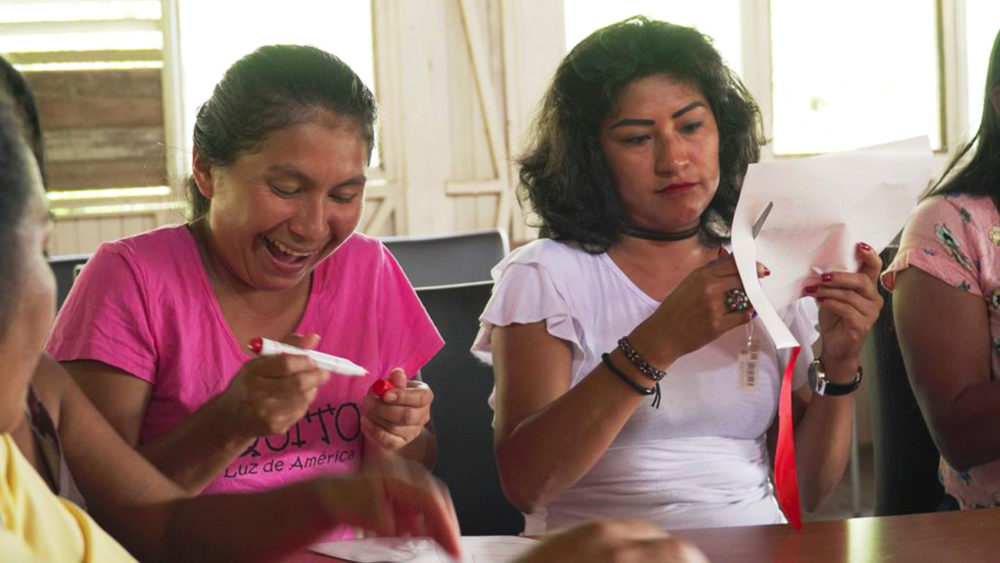Within the framework of the project “Gender mainstreaming in the PROAmazonía program (MAATE-MAG): GEF Project,” executed by UN Women in coordination with the team of PROAmazonía, actions are carried out for the promotion of bioentrepreneurships with a sustainable gender approach that use Non-Timber Forest Products (NTFPs).
Bioentrepreneurships are alternatives to generate sustainable economic products over time that do not affect or aggravate the conditions generated by climate change. The incorporation of the gender approach in PROAmazonía, a program of the Ministry of Environment, Water and Ecological Transition and the Ministry of Agriculture and Livestock with the support of UNDP, has been structured from the design to the marketing of the product in these economic alternatives.
Gender is a fundamental factor in the analysis of environmental changes and in conservation proposals. The gender category explains the different use that women and men make of resources, due to the differentiated roles, activities and responsibilities that society assigns them according to their sex.
In Ecuador, rural women are 20% poorer than urban women and indigenous women are 30% poorer than the national average, according to UN Women (2019). These limitations are exacerbated by the concentration of land and means of production, where 88.2% of producers are male owners, as shown in the 2000 National Agricultural Census.
An example of this is the story of Tania, who finished her studies and got married at the age of 17. Before the sun came up, she was already leaving her community and her daughter to go to work for a company. “She worked long hours. I almost lost my daughter at that time and I said: I’m not going to lose a daughter for a job,” she said.
Supported by her mother and husband, she decided to leave this activity and work in agriculture. “She planted yucca, banana and other things. It was nice to go to the market, sell your products and in one day you came back with the money you earned,” she adds. She is a curious woman, eager to learn and fell in love with her husband’s project: beekeeping.
“At first I was afraid because I thought the bees were going to sting me, but these animals are very important and little by little I fell in love with the project. Now we are working on convincing more and more women,” said Tania.
Together with 30 other people from the community of San Luis, in Zamora Chinchipe, Tania is working on the development of a beekeeping bioentrepreneurship supported by PROAmazonía as part of the natural heritage conservation strategy.
In this sense, the project “Incorporation of the gender approach in the PRO-Amazonian program (MAATE-MAG): GEF Project,” executed by UN Women in coordination with the team of PRO-Amazonía participates in the promotion of Non-Timber Forest Products (NTFP), such as the bioentrepreneurship of Tania and her community.
Within the framework of the agreement between PROAmazonía and UN Women, training was provided on strategies and tools to strengthen the inclusion of the gender perspective in bioentrepreneurships and at least 15 of the 16 existing bioentrepreneurships were accompanied in the application of these tools.
The incorporation of gender mainstreaming in bioentrepreneurships requires the identification of the participants (gender, age, ethnicity) and an analysis of the gaps and inequalities in relation to access to decision-making, control of resources, participation, as well as interests, expectations and potential.
According to Tania, she had heard of the term gender approach, but the workshops allowed her to broaden her knowledge and put what she learned into practice in bioentrepreneurship she is working on. “These are strategies that allow us, as women, to fulfill our goals, opportunities and equality in the political and social spheres,” she mentioned.
The workshops conducted allow women to acquire the tools to include the gender approach in their bioentrepreneurships. Active participation builds dialogues between bioentrepreneurship implementers, communities and technicians. A joint effort is needed to move the projects forward.
The participants in the workshop held on gender inclusion in bioentrepreneurships, recorded their appropriation of the learning tools. Some of them were:
- “The project is visualizing young people so that they are also participants in this project and that we have gender equality” (Alicia Criollo. ONISE)
- “It has allowed us to think about the transmission of knowledge and worldview from a gender perspective” (Maria Elena Pulgar, UISEK. Wayusa Kichwa Limoncocha Community Project).
- “Through training we can encourage young women so that they can participate in any decision making, in assemblies, with the government, to empower and strengthen women” (Juan Yiyocuro, ONISE).

Photograph: UN Women (Archive images)
Description: Groups of women who have participated in workshops on gender inclusion
Author: Andrea Nina Pereda, Project Coordinator “Implementation of the gender strategy with cultural relevance in PROAmazonía” – UN Women Ecuador
 Español
Español English
English

Comments are closed.